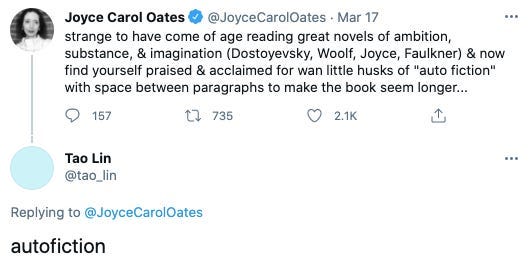Autofiction has grown in popularity massively in the past five years. Yes, it’s been around a lot longer than that and it’s difficult to periodise. Any ‘moment’ or explosion within the zeitgeist of a particular style, inevitably gets wrapped up in people trying to claim its origins. Here, however, I’m only concerned with its most recent incarnation. In this particular ‘moment’, one in which identity and commodity are increasingly enmeshed, the specific way in which the individual is privileged is informed by different forces than, say, the style’s metafictional parent.
In postmodernism, the presence of the author is often explicitly inserted into the text but, usually, as a brief interlude (see The Pale King’s ‘author here’ chapter), or as a named yet peripheral character (see Douglas Coupland’s JPod), or even as the author, writing an introduce and assembling found documents and stories (see Poor Things by Alistair Gray). Stylistically, though, there’s often no debating that this is indeed a novel. The more recent efforts include Rachel Cusk, Lisa Halliday’s Asymmetry, Ben Lerner and, of course, Knausgaard’s six-book epic fictionalised biography: My Struggle.
But, as I said, I’m not here to periodise. Nor am I here to diagnose the particular minutiae of style that deem something autofiction rather than memoir, biography, or novel. I am actually really partial to a literary biography or memoir. I do love moments of intensely personal and introspective prose. But I’m tired of the blurring of the two. That’s why I’m going to ruminate a little more on autofiction, centering on one novel in particular: Brandon Taylor’s Late Americans published in 2022.
Brandon Taylor, for me, has never fit into the categories I’ve discussed here. Despite heavy biographical overlap between his characters and himself, his novels and stories are very explicitly rich with the markers of fiction. The language is sometimes florid, sometimes clipped. His work centres on the delicacy and enormity of several characters’ internal worlds, often with a variety of different experiences and styles of communication, or an inability to communicate at all.
Both Taylor’s debut Real Life and sophomore collection of short stories Filthy Animals hone in on a network of different voices, honouring the uniqueness of these perspectives without sacrificing the exclusive third person narration. There is still a penchant for reality and the complex interiority of a particular kind of striving, young, often male, often black, often queer voice, attempting to make itself heard, but that is always amongst a cacophony of well-wrought and nuanced characters experiencing that in unique ways.
This is slightly different in Late Americans. The body and mind of each of the characters is performed in a more explicit way as the majority of the characters are in the performing arts as dancers or musicians. The novel also consistently details the way in which these characters perform themselves in a sexual context, amplifying their viscerality, fragmentedness, and the choreographed way they interact with one another.
Sex and dance become one and the same in Late Americans wherein the self is definitively split between the act of perceiving and being perceived. This is especially stark in Ivan’s story. After finding out ‘his tendons were bad’, Ivan has turned away from ballet towards a career in finance, his income buoyed up by uploading pornographic videos. These videos are artful, strange in their abstraction, and sexuality comes secondary to just movement. Ivan is described, after recording the first one, as feeling nothing but ‘the satisfaction afterward of having moved’. The videos are like choreographed vignettes and ‘began in the body and ended in the body’.
The idea of consumption runs throughout the novel and this is another way in which the boundaries between artistic production and fucking are woven into the everyday gestures of the characters. For example, both Seamus and Ivan’s sexual relationships are framed by similar descriptions of food. When Seamus is about to have an abusive encounter with Bert, a closeted older landlord who sexually assaults him, there’s a focus on the way in which he wets ‘his fingertips in the pulpy juice’ of a ‘can of whole San Marzano tomatoes’. Fyodor’s sexual tension with his partner Goran is equally framed by ‘the oily salt of it, the brine of the tomato sauce’. This persistent alignment of sexual encounter with abstract sensorial detail becomes quite heavy handed after the third or thirteenth time it happens.
In an article on Taylor’s Substack Sweater Weather, he argues that: ‘there are no more local lives. Not in the great digital demimonde which acts as a totalizer and a popularizer both.’ This is a useful framework for what is frustrating about this wave of autofiction, and Taylor’s latest novel in particular, where characters blur and the distinctness of voice is somewhat absent. If indeed the locality of the individual, the intimacy of the unique perspective, is eroded by being chronically online, then the way we interact, how we speak, how we fuck even, becomes a performance of some sort of collective, zeitgeisty ‘mode’. In this ‘digital demimonde’ we are both discrete entities, ‘main character energy’, whilst simultaneously nonexistent unless our best self is the right kind of self.
Of course, this isn’t news; this is just one of the latest insidious manifestations of late stage capitalism. We are ironically trapped in a mode of being which results from trying to reinforce a uniqueness and individuality with only a certain set of tools, only allowed to assert ourselves in a particular way, to the right audience. Several different characters are described as ‘sore’ with a similar ‘ache’, they smack their lips and hold their breath, they are all ‘gripped’ and ‘pulled’ by one another, their encounters all permeated by the same sense of violence in a way that erodes their distinctness.
Is this something that Taylor is doing deliberately? Is this one of the points of the novel? Is this merging of different identities, couples, and their dynamics especially, a commentary on an evacuation from ‘local lives’? Personally, I think that would be being too generous. Instead, I think it’s less a deliberate manifestation of these ideas within the prose and rather a writer wanting to write one perspective, or one form of relationship, who felt the need to multiply it in order to sufficiently build a world or community. Instead what we get is a group whose individuality is difficult to determine, whose stories are therefore difficult to invest in, and threads I became increasingly bored with trying to cling to.
Something I love about Taylor’s previous work is that there’s often a singular central character around which a centrifugal whirl of others exists, their perspective pushing in on, but never quite permeating, the primacy of the main narrator. Here, it felt like a gesture of democracy towards the storytelling perspective cost the novel its emotional resonance.
So, what’s all that got to do with autofiction? The homogenisation of the tone of voice, the descriptions, the lack of a tangible central character, all left me feeling like somebody just wanted to talk about themselves.
There are moments where the prose is interrupted by an insisten, extradiegetic voice that feels like an explicit “author here” moment, but to have a hot take moment. Out of place amongst clipped descriptions of cum and tomato sauce, it’s too far into the journalistic, much like the insufferable email sections of Sally Rooney’s Beautiful World, Where Are You? (yep, going for it again).
One of these whiplash moments is when Goran is described as belonging to a rich family who’ve ‘grown obscenely wealthy for their early intervention of key manufacturing technologies and the reconstitution of American slavery as they exploited the labour of the working industrial class’. Okay, yes, of course these facts that disrupt the flow of the novel are true. They also resonate with the reality Taylor is trying to depict. They don’t sit right in the prose though, and instead feel like an author saying “hey, just in case you didn’t get what I was trying to say with the characters, let me just spell this out for you”.
This is one of the biggest failures of fiction which errs on the side of autofiction, for me. And this is where Taylor’s failed too. The novel is not a group of perspectives whirring from the daily struggles of existence, responding in their own unique ways. The novel is an amorphous cipher for an author that seems determined to say one thing and says it, tiresomely, in every way possible.
We may know the kind of reality Taylor is trying to depict (a reality which would sing if it were orbited by some contrasting characters, drawing out the nuance and beauty of that particular perspective.) Reality here, however, is singular, spread too thinly across a group of people who are all fucking, talking, and moving in the same ways. That’s what feels missing in a lot of the more contemporary examples of autofiction: the auto has completely eclipsed the fiction, and the perspectives are flattened to be digestible, familiar, and predictable.






